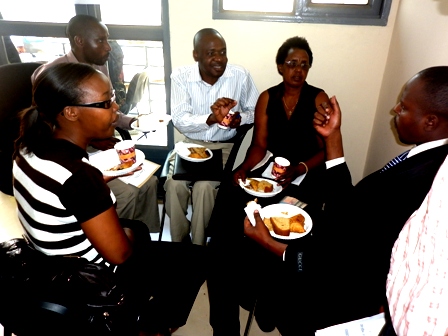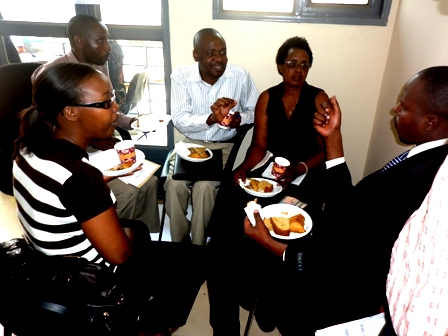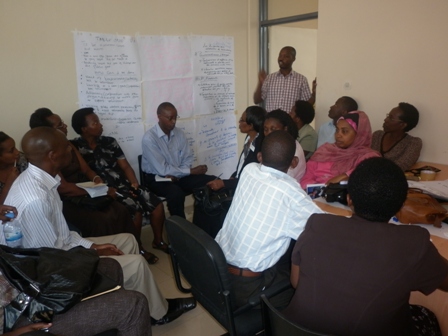
On Friday, August 27th, twenty-two lawyers met at the Kigali Defender Resource Center to discuss ways in which they can create momentum in the legal aid community in Rwanda. This core group of volunteer lawyers comprises the Rwanda Legal Defense Task Force. They are dedicated to affecting systematic change in the Rwandan justice system and legal community. They enjoyed breakfast and tea while discussing the way forward.
The task force was challenged to address three critical questions; and broke into three separate groups to come up with answers. The first session involved defining the role of a volunteer lawyer. Patrick Pratt, an intern with IBJ in Rwanda, initiated the discussion of volunteerism with an account of his volunteer experiences throughout life. “To be a volunteer means to serve a cause higher than oneself; with the expectation that there will be little or no material benefit in return. Volunteerism means personal sacrifice for the public good.”

A Criminal Defense Task Force Focus Group discusses how the lawyer community in Rwanda can promote systemic change
Keeping with this theme, the first group addressed he challenges of volunteerism in the legal aid community in Rwanda. Though there is a sense of need, the fact remains that resources are needed to carry out the sometimes expensive process of representing clients. They concluded that advocacy and cooperation among lawyers is the best way to mobilize funds to carry this out. This also includes making visits to prisons and police stations to educate penal officials about the need for legal representation for the criminally-accused. All agreed that in order to facilitate volunteer activities, IBJ could help by providing support facilities such as research center and office equipment.
The second group of lawyers tackled the conceptual problem of defining an ideal legal aid system in Rwanda. The group seemed to reveal more problems than concrete solutions. They pointed to the lack of an overarching legal aid policy, and the corresponding lack of financial allocations in the national budget, to be the biggest obstacles towards systematizing legal aid in Rwanda. For example, the Rwandan Criminal Procedure provides that all Juveniles shall be represented by counsel at trial, and they cannot undergo trial in court without legal representation. However, there are no funds to enforce the law. The discussion group also pointed to the tendency of legal aid to be viewed as charity, rather than a legal right supported by public resources. They also acknowledged the need for public awareness about fundamental legal rights; as well as a more thorough understanding among “among local authorities, police, opinion leaders, community members, and [even] paralegals” of the right to legal representation. Though the problems confronting the establishment of a legal aid system in Rwanda are many, the discussion initiated by the task force signals a promising start.
The third group discussed the issue of each lawyer’s personal contribution, as well as that of the community of lawyers, to realizing solutions to the legal aid deficit in Rwanda. Suggestions for possible personal contributions include a commitment to rendering pro-bono legal services at least once a month or according to availability. This includes offering legal services at the prosecution level in prisons. There is also a need to personally advocate for the right to legal aid when interacting with other justice sector actors. This advocacy also extends to the national level; wherein a community of lawyers must collectively advocate for policy change; as well as engage the public to inform citizens of their legal rights. The ever-present issue of resources to support legal aid may be addressed in part by advocating for public funding, and for contributions of nongovernment entities and individuals. This includes personal financial contributions of lawyers themselves in some cases.

IBJ Fellow John Bosco Bugingo reviews the recommendations of the Criminal Defense Task Force
The common thread that bound all of these discussions was the issue of capacity. Resources are needed to affect any significant change in the legal aid system in Rwanda. Suggestions for capacity-building initiatives included an increased number and frequency of criminal defense training for lawyers, and a better-equipped Defender Resource Center at the IBJ office. Also, lawyers expressed the need to visit many locations in Rwanda, including prisons and detention centers, to gain a more accurate picture of the scope of problems facing the legal aid community. Without this information, it would be difficult to formulate an appropriate response to such pressing issues.
The issues which were discussed – and the corresponding problems and solutions – are the very things which IBJ is working to resolve. IBJ hopes to continue to address these concerns with public awareness campaigns, support for legal aid, and close cooperation with the Ministry of Justice to create a national policy framework for legal aid. Of course it will take the sustained cooperation of dedicated lawyers in the legal aid community, as well as the governing institutions of Rwanda.
As the lawyers finished their morning tea, and concluded the discussion, there was a residual sense of optimism. Many of them stayed long after the meeting to collaborate with fellow lawyers on workable solutions. Though the work confronting the legal aid community seems daunting, articulating such concerns creates a more accurate picture of the problem. This of course will require the continued engagement of the Task Force. Hard work now means that one day such serious conversation will not interfere with a good breakfast.